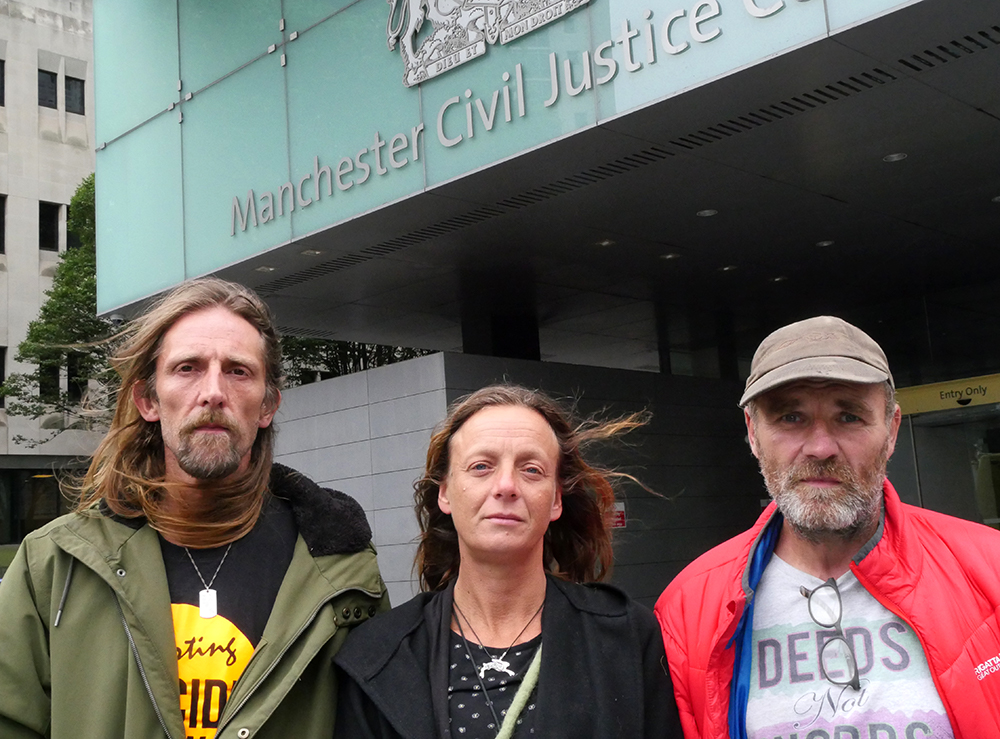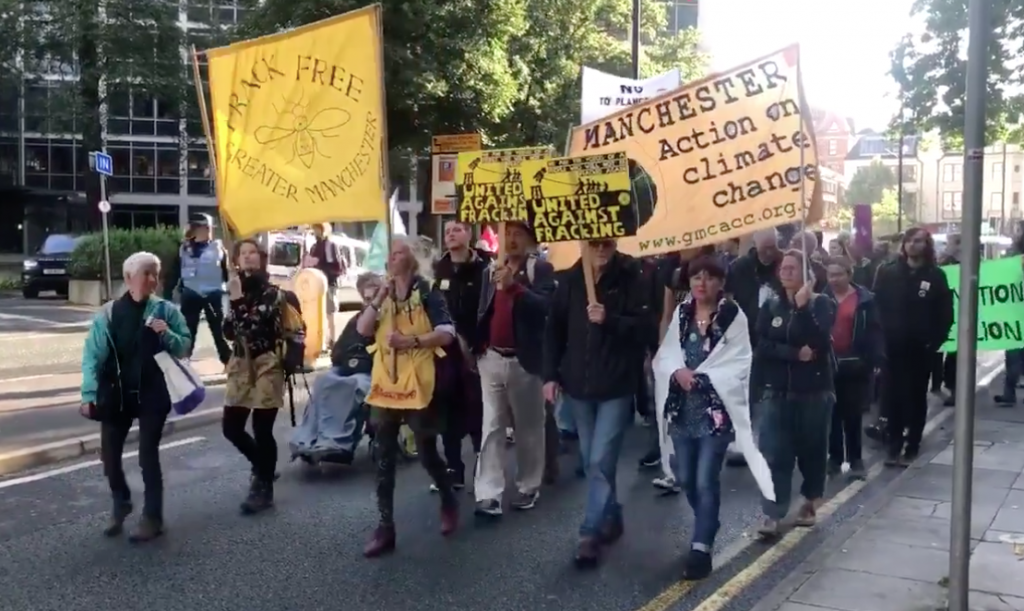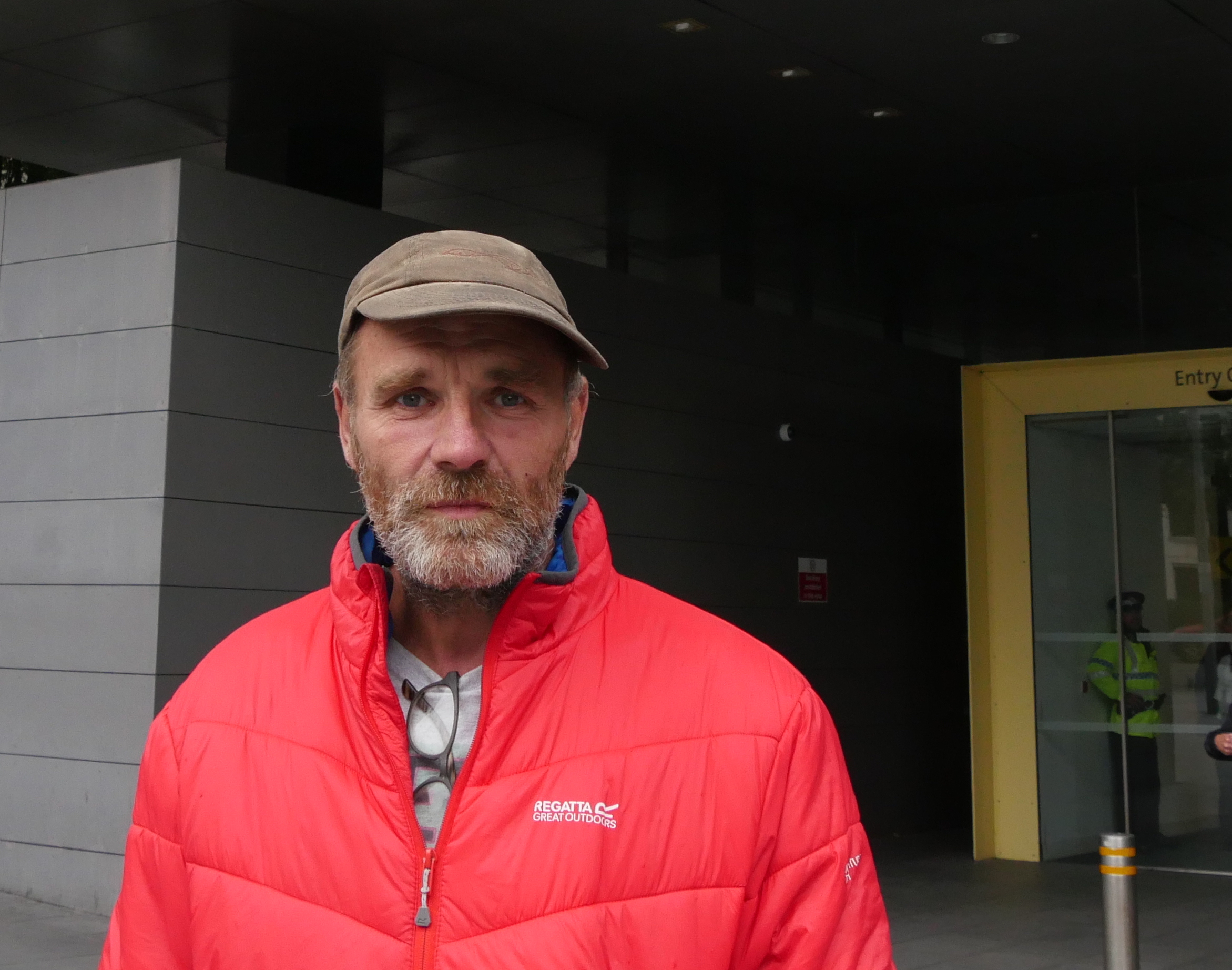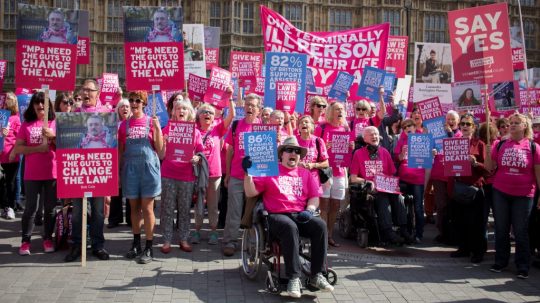“I am undeterred,” said former soldier-turned-campaigner Christopher Wilson after being sentenced to four weeks in prison suspended for two years.
“[Fracking] directly threatens my children’s future. And my grandchildren, well they may not even get a future if this industry is allowed to continue unchecked,” he added. “So, the fact that I may serve some time in jail for protesting – I don’t think is a valid reason not to.”
Wilson, or Jag as he prefers to be known, was among six protesters who, on 24 July last year, locked themselves together at the entrance of a Lancashire shale gas site run by fracking firm Cuadrilla. All traffic going in and out of site was blocked until police pulled them loose after around six-and-a-half hours.
The 55-year-old on Tuesday (3 September) was one of three people to be given a suspended jail sentence for breaching a court-ordered injunction curtailing protests by “persons unknown” – in other words, anyone – at the fracking site in Preston New Road, near Blackpool. It is thought to be a UK first.
Earlier that day Judge Mark Pelling QC, who had approved this injunction in July last year, dismissed the trio’s bid to have the order quashed after a series of tremors recorded since last Monday forced Cuadrilla to suspend fracking at the site. One of these is believed to be the biggest fracking-related tremor ever recorded in the UK – at magnitude 2.9.
The Preston New Road three – completed by Katrina Lawrie and Lee Walsh – have now vowed to take their battle against the “draconian” injunction to the Court of Appeal.
Speaking outside Manchester Civil Justice Centre, Lawrie told EachOther: “An appeal is being immediately launched, regardless of the fact that we have no legal aid and regardless of the fact that one of ours has been told that he hasn’t received legal aid and he should crowdfund.”
“We’re disgusted by that. It is justice for the highest bidder and we won’t accept that at all.”
Lawrie received an additional two-month sentence, also suspended for two years, for a separate breach of the injunction in August 2018. She ran into Preston New Road causing a lorry to swerve in a move Judge Pelling said carried a “serious risk of death or injury,” although no one was physically harmed.

Lee Walsh, Katrina Lawrie and Christopher Wilson. Image Credit: Aaron Walawalkar
When we hand this planet over, we’ve got a duty to hand it over a better place than we found it.
Christopher Wilson, anti-fracking campaigner
Jag told EachOther that he joined the anti-fracking movement in Lancashire around two-and-a-half years ago, after growing increasingly concerned about the impact of fracking on the environment and his children’s future.
“The industry has been foisted on us and I consider it to be a threat to the future of people who are very dear to me. I didn’t have any choice but to get involved,” he said. “You can say: ‘Well, somebody else is dealing with that’ and then you cross that line and you think: ‘No, I have to deal with it.’ And that is where I am now.”
Jag, Lawrie and Walsh are among around 20 people who live in a camp near to the Preston New Road site. The camp is alcohol-free, Jag said, focussed on its mission to monitor Cuadrilla’s activity 24/7 as well as mounting occasional direct action campaigns.
Jag served in the armed forces in Northern Ireland during the 1980s, it emerged in court. During sentencing his barrister Richard Brigden said: “He has served his country and continues to serve his country in doing what he does”.
This experience has inevitably shaped his world view, he said. “I saw the law abused a lot over there. And it did kind of cost me my respect for the law and people who administer it. It made realise that justice is a completely separate concept and that’s really what the law should serve.”
He added: “When your laws are unjust then I think you have an obligation to be breaking them. I appreciate that the rule of law must be upheld. But the law has to be answerable to the concept of justice”.
“When we hand this planet over, we’ve got a duty to hand it over a better place than we found it. And that’s not happening here. But it will, as long as we don’t give up.”
The Right To Protest

September 2019. Protesters outside Manchester Civil Justice Centre. Credit: Twitter/@Anna_Jameson_.
Protest is protected in common law and by Articles 10 and 11 of the Convention on Human Rights – the rights to freedom of expression and freedom of assembly.
Both of these rights are qualified. This means public authorities can take proportionate action to interfere with them if it is (for example) in the interest of public safety, the prevention of disorder or crime, or the protection of other people’s rights and freedoms.
Barrister Adam Wagner, representing Lawrie and Walsh, on Monday called for the injunction to be lifted while fracking remains suspended. But Judge Pelling refused citing a lack of advanced notice.
Wagner then sparred at length with barrister Tom Roscoe, representing Cuadrilla, to amend some of the restrictions in the “draconian” injunction which he argued were “too wide” and “insufficiently clear”. It was claimed that uncertainty around what conduct was prohibited by the injunction would have a “chilling effect” on protesters.
I think that once you give a corporation the right to dictate what protest it finds acceptable – it’s not protest anymore.
Christopher “Jag” Wilson, anti-fracking campaigner
In weighing up proposed amendments to some of the court order’s restrictions, Judge Pelling said: “It is common ground that the issues which the defendants wish to protest are important and are sincerely held. It is equally common ground that the defendant should have the right to express the views they wish to express”.
But he stated that protections for freedom of expression and freedom of assembly under the Human Rights Convention are “qualified”.
“They do not trump the rights of others – including [Cuadrilla’s] rights under Article 1 of the First Protocol,” he said. This provision protects the right to “peaceful enjoyment” of property.
While some amendments were adopted – the protesters were disappointed by the result.
“I think that the injunction in and of itself is an obscenity and should be quashed with extreme prejudice,” Jag told EachOther. “I don’t think you can say that a corporation’s right to pollute trumps my right to protest it. I think that once you give a corporation the right to dictate what protest it finds acceptable – it’s not protest anymore.
“They’re saying: ‘Okay, you can wave as many placards as you like, we can just ignore them’.
“No, I am not going to do that. I am going to put my body in the way because that industry threatens a community who said they don’t want it.”
‘Inequality Of Arms’
The protesters now intend to challenge Judge Pelling’s ruling at the Court of Appeal. Their lawyers will argue that they should not have been found in contempt of court because the order was not clear enough.
Wagner argues that the injunction was imposed in “almost identical” terms to an order the Court of Appeal overturned in a case against Ineos, another fracking firm, in April.
He added: “Inequality of arms is an extremely worrying feature of these cases. Protesters with little or no resources are up against multinational companies with almost unlimited funds”.
The protesters have reportedly been denied legal aid because they are “well organised and capable of fundraising”. They also face having to fork out legal costs of more than £70,000.
Environmental organisation Friends of the Earth were due to take part in the proceedings but said they were “priced out” because they were refused public interest costs protection by the Judge.
What Does Cuadrilla Say?
In a statement released after last week’s 2.9 magnitude tremor, a Cuadrilla spokesperson said: “People have asked why we are doing this and our answer remains unchanged, we are exploring for shale gas at Preston New Road with the aim to establish a domestic energy supply that the UK really needs”.
They added that “natural gas is recognised by the experts to be an important part of the solution” to achieving the government’s target of reaching net zero carbon emissions by 2050.
“We intend to be a part of that solution in providing lower emission UK shale gas to replace higher emission imported gas whilst also generating local jobs and economic benefit.”
Adam Wagner is chairman and founder of EachOther. He played no role in writing this article.
Read more:
- EachOther report from day one of the court hearing and on the sentencing.
- Read how the Court of Appeal overturned anti-fracking protesters’ prison sentences in a separate case.
- Take a look at recent action on climate change in the UK’s capital.







